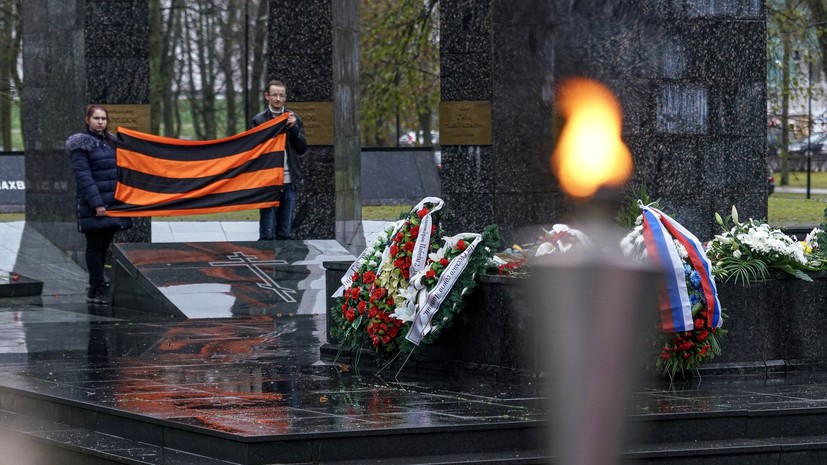The official representative of the Russian Foreign Ministry Maria Zakharova commented on the vote of the Latvian parliament on the ban of St. George's ribbons in the country.
“In this country, we are witnessing the successive reincarnation of fascism: the prohibition of the symbolism of fighters against fascist criminals and at the same time the legalization of the processions of the Waffen SS veterans,” she wrote on her Telegram channel.
Zakharova also stressed that the moire ribbon of the medal "For Victory over Germany in the Great Patriotic War" is St. George's.
"Does this mean that now veterans living in Latvia cannot wear it even on holidays?"
- she wrote.
Earlier, the Seim of Latvia in the third, final reading approved legislative amendments providing for a ban on the use of St. George's ribbons during public events and processions.
During the voting, the majority of the deputies supported the amendments to the law “On the safety of public entertainment and festive events” and to the law “On assemblies, processions and pickets”.
Earlier, the Russian Foreign Ministry has already spoken about the plans of the Latvian parliament to legitimize the ban on wearing St. George's ribbons.
Maria Zakharova also made an official comment on this matter.
The statement indicated that a positive decision on the draft law discussed at that time suggests that Riga acts as a country in which there is a war with historical symbols.
The Foreign Ministry then expressed confidence that international structures should not leave these "provocative steps" unattended.
Commenting on the decision of Riga, a member of the Federation Council Committee on International Affairs from the Republic of Crimea, Sergei Tsekov, said that the initiators of the ban "do not respect history at all."
According to him, the St. George ribbon is a symbol of the Soviet army.
“The army that liberated Europe from fascism, including the liberation of Latvia.
And in this case, of course, there must be respect.
This is another indicator of Russophobia, which is expressed in the policy pursued by the current Latvia.
After the collapse of the USSR, Latvia, as it chose the Russophobic course, and adheres to it, "Tsekov said in an interview with RT.
In turn, State Duma deputy Alexei Chepa said that this is a distortion of history.
The parliamentarian also noted that "the so-called politicians are trying to distort the historical truth and harm society, harm the world."
“We must not forget history, both good and bad.
Everything must be remembered, and distorting is unacceptable, ”Chepa added.
As Dmitry Belik, a member of the State Duma Committee on International Affairs, noted, the European Union is trying to "ban everything as much as possible that would at least somehow connect its citizens with Russia."
“To destroy what would at least somehow remind that the Latvians together with the Russians fought against Nazism, and to destroy what would remind of the joint presence of the republics in one big country - the USSR,” he concluded.
He drew attention to the conditions in which the Russian-speaking residents of Latvia found themselves.
The parliamentarian called the St. George ribbon a symbol of resistance to Nazism.
“It is like a banner of people who do not agree with the manifestations of Nazism and the oppression of the Russian-speaking population.
Latvia, one might say, leads the list of countries that create unbearable conditions for Russian-speaking citizens.
The country today demonstrates adherence to Western and, first of all, American democracy, and if it were given free rein, it would generally expel all Russian-speaking citizens, ”the deputy said.
Also on russian.rt.com "Society will keep silent again": why Latvia intends to prohibit veterans from wearing Soviet military uniforms on May 9
Note that in June 2019, Latvia also introduced a ban on wearing military uniforms of the USSR and Nazi Germany.
The measure extended to a number of other elements of the USSR's symbolism, in particular, the display of flags, the performance of the anthem and the use of the hammer and sickle symbols in combination with a five-pointed star.
The new decision of the Diet on the St. George ribbon was noticed in Latvia itself.
The party "Russian Union of Latvia" announced its intention to challenge the decision of the Seim.
The political association recalled that Latvia was the second country to make such a decision.
“Latvia has become the second country in the world that has banned the use of the St. George ribbon - a symbol of the memory of the price at which our fathers and grandfathers won victory in the war against the German fascist invaders, the memory that we are their heirs and must remember and be proud of their feat "- said in a statement of the party, published on Facebook.
The members of the association stated that "the ribbon can be banned, but no vote can erase the memory of the people and make them forget history."

